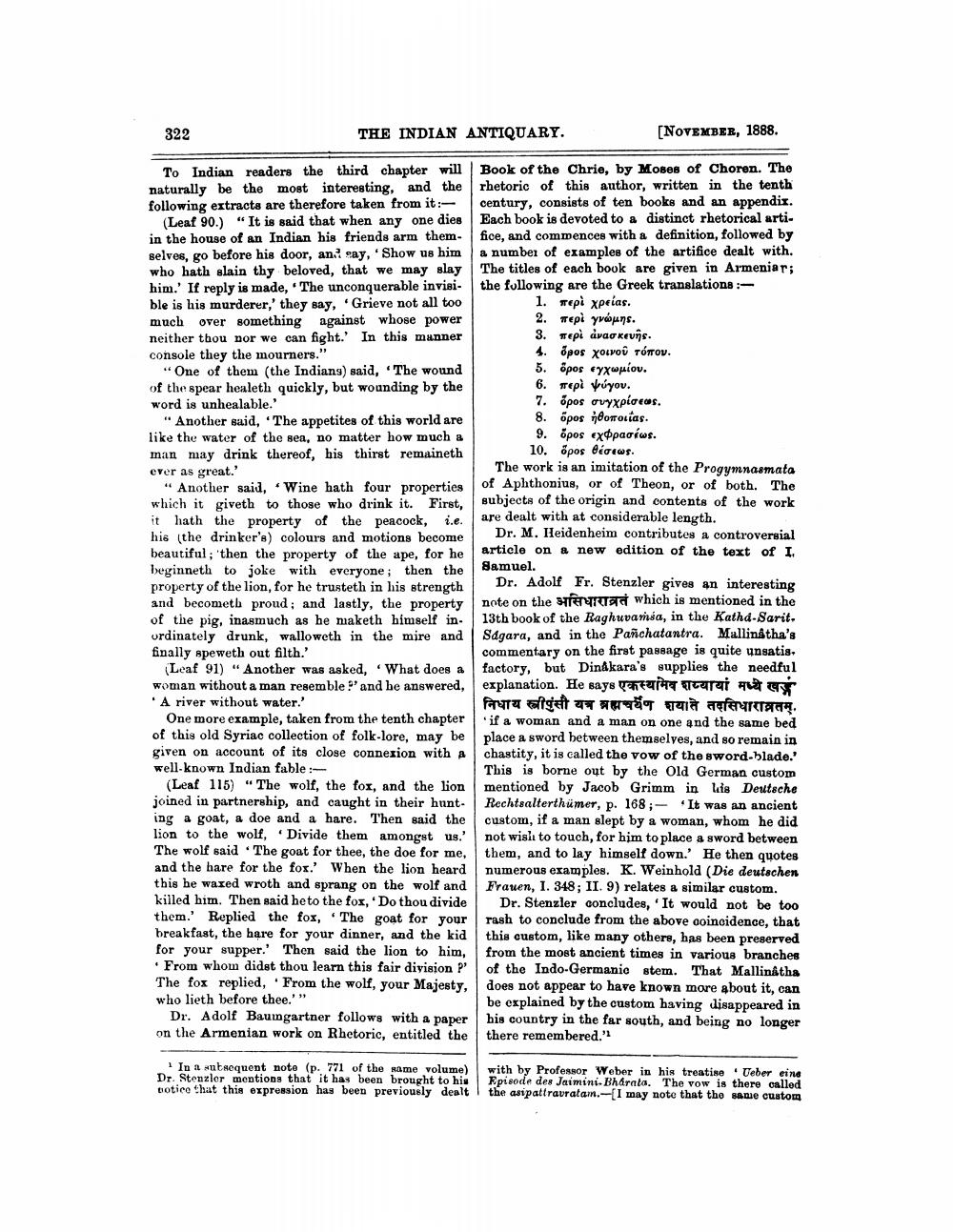________________
322
THE INDIAN ANTIQUARY.
[NOVEMBER, 1888.
To Indian readers the third chapter will Book of the Chrie, by Moses of Choren. The naturally be the most interesting, and the rhetoric of this author, written in the tenth following extracts are therefore taken from it :- century, consists of ten books and an appendix.
(Leaf 90.) "It is said that when any one dies Each book is devoted to a distinct rhetorical artiin the house of an Indian his friends arm them. fice, and commences with a definition, followed by Belves, go before his door, and say, 'Show us him | a number of examples of the artifice dealt with. who hath slain thy beloved, that we may slay The titles of each book are given in Armeniar; him.' If reply is made, The unconquerable invisi- the following are the Greek translations :ble is his murderer,' they say, "Grieve not all too
1. Tepi xpeias. much over something against whose power
2. epi youns. neither thou nor we can fight. In this manner
3. Tepi ávao kevñs. console they the mourners."
4. Öpos Xouvoù tómov. "One of them (the Indians) said, "The wound
5.opos explov. of the spear healeth quickly, but wounding by the
6. Tepi úyou. word is unhealable.'
7. õpos ovexploeas. "Another said, "The appetites of this world are
8. õpos nomouias. like the water of the sea, no matter how much a
9. opos ex paréws. man may drink thereof, his thirst remaineth
10. pos Oérews. ever as great.'
The work is an imitation of the Progymnasmata "Another said, “Wine hath four properties
of Aphthonius, or of Theon, or of both. The which it giveth to those who drink it. First,
gubjects of the origin and contents of the work it hath the property of the peacock, i.e.
are dealt with at considerable length. his (the drinker's) colours and motions become
Dr. M. Heidenheim contributes a controversial beautiful; 'then the property of the ape, for he
article on a new edition of the text of I. beginneth to joke with everyone; then the
Samuel. property of the lion, for he trusteth in his strength
Dr. Adolf Fr. Stenzler gives an interesting and becometh proud; and lastly, the property note on the RTG which is mentioned in the of the pig, inasmuch as he maketh himself in. 13th book of the Raghuvamsa, in the Kathd-Sarit. ordinately drunk, walloweth in the mire and Sdgara, and in the Panchatantra. Mallinátha's finally speweth out filth.'
commentary on the first passage is quite unsatis. Leaf 91) "Another was asked, "What does a factory, but Dinakara's supplies the needful woman without a man resemble and he answered, explanation. He says THT Teurgi F y 'A river without water.
निधाय स्त्रीपुंसी यत्र ब्रह्मचर्वण शयाते तदसिधाराव्रतम्, One more example, taken from the tenth chapter if a woman and a man on one and the same bed of this old Syriac collection of folk-lore, may be place a sword between themselves, and so remain in given on account of its close connexion with a chastity, it is called the vow of the sword.blade.' well-known Indian fable :
This is borne out by the Old German custom (Leaf 115) "The wolf, the fox, and the lion mentioned by Jacob Grimm in luis Deutsche joined in partnership, and caught in their hunt. Rechtsalterthümer, p. 168 ; - It was an ancient ing a goat, a doe and a hare. Then said the custom, if a man slept by a woman, whom he did lion to the wolf, Divide them amongst us.' not wish to touch, for him to place a sword between The wolf said. The goat for thee, the doe for me, them, and to lay himself down. He then quotes and the hare for the fox.' When the lion heard numerous examples. K. Weinhold (Die deutschen this he waxed wroth and sprang on the wolf and Frauen, I. 348; II. 9) relates a similar custom. killed him. Then said he to the fox, 'Do thou divide Dr. Stenzler concludes, 'It would not be too them.' Replied the fox, The goat for your rash to conclude from the above coincidence, that breakfast, the bare for your dinner, and the kid this custom, like many others, has been preserved for your supper.' Then said the lion to him, from the most ancient times in various branches • From whom didst thou learn this fair division of the Indo-Germanio stem. That Mallinatha The fox replied, From the wolf, your Majesty, does not appear to have known more about it, can who lieth before thee.'”
be explained by the custom having disappeared in Dr. Adolf Baumgartner follows with a paper his country in the far south, and being no longer on the Armenian work on Rhetoric, entitled the there remembered."
In a nutsequent note (p. 771 of the name volume) Dr. Stenzler mentions that it has been brought to his totice that this expression has been previously dealt
with by Professor Weber in his treatise Ueber eine Episode des Jaimini, Bharata. The vow is there called the asipattravratam.-{I may note that tho sane custom




